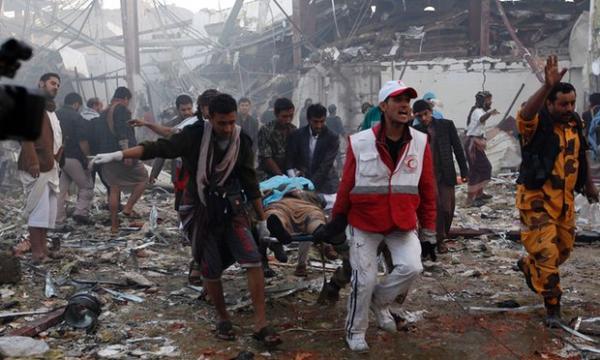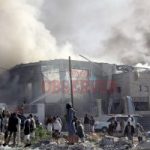SANAA, Oct. 09 (YPA) – The sixth anniversary to bomb Al-Ruwaishan family’s funeral hall by the Saudi-led coalition air strikes in the capital, Sanaa, has marked, which was included hundreds of mourners, including senior civil and military leaders, and tribal sheikhs, in addition to children.
In a report issued by Yemen Press Agency, the horrific crime of the Great Hall in the capital Sanaa, which was committed by the coalition with an aerial bombardment of warplanes on October 8, 2016, remains alive in the memory of Yemenis and a witness to the largest massacre against civilians in Yemen, which reflects the bloody and criminality of the coalition.
Two consecutive strikes, 7 minutes apart, confirmed that the coalition deliberately targeted mourners in the Hall and committed the crime, then paramedics and the wounded under the rubble, causing the deadliest massacre in Yemen.
Over 940 civilians, including 156 dead and 784 wounded, including 13 bodies whose identity was not known as a result of charring, while the bodies of a number of victims were not found as a result of direct bombing, in addition to 20 children were injured, most of them caused permanent disabilities.
This massacre committed by the coalition with a US weapon and decision, according to “Human Rights”, which confirmed that the US-made GBU-12 Paveway II weapon, weighing 225 kilograms, guided by a laser type (MK82), was a full-fledged war crime in accordance with international humanitarian law.
The crime of targeting a funeral hall in the capital had international and regional reactions that denounced the crime of the coalition, starting with the United States of America, which tried to dust off its crime from the American mantle.
After the crime, the US National Security Council spokesman Ned” Price said, “US security cooperation with Saudi Arabia is not a blank check,” adding, in light of this and other recent incidents, we have taken an immediate review of our already significantly curtailed support for the Saudi-led coalition.”
Meanwhile, the coalition tried to evade the crime by denying its involvement, claiming that the crime was an internal conflict between Sanaa government officials.
Despite the coalition’s attempts to evade responsibility for the crime, the former Secretary-General of the United Nations, Ban Ki-moon, said that initial reports indicated the responsibility of the Saudi-led coalition for the bombing, where the coalition denied these accusations at first.
On the other hand, BBC TV revealed that Saudi Arabia admitted unannounced that one of the warplanes of the military coalition it led bombed a funeral hall in Sanaa, justifying the crime as a mistake in providing information by the staff of the Ministry of Defense of the “Hadi government.”
At that time, the so-called Joint Incidents Assessment Team of the Saudi coalition, regarding the incident of targeting the Great Hall in Sanaa on Saturday, October 15, issued a statement in which “a party in the forces of the “Hadi government” provided false information about the presence of leaders in Sanaa armed forces inside the hall, and that the Operations Guidance Center In Yemen authorized the raid without the permission of the coalition leadership.
International reactions to the Great Hall massacre
As for the former Secretary-General of the United Nations, Ban Ki-moon, he commented on this crime by saying: “Initial reports regarding the attack on the mourning council in Sanaa indicate the “responsibility” of the Arab coalition for it, at a time when he called for the formation of an international investigation committee into the attack. “Initial reports indicate that what happened in the mourning hall was an attack by the coalition forces,” Ki-moon added, in statements to reporters at the headquarters of the International Organization in New York, after the crime, that a “brutal attack on civilians was a shameful violation of international humanitarian law.” The hall was a social center known to all, crowded with people, families and children.
The UN Special Envoy to Yemen, Ismail Ould Cheikh Ahmed, said: “Everything should be done to bring the perpetrators of these heinous attacks to justice. We were all touched by the fact that these attacks took place at a time when important progress was being made after long negotiations, and at a time when we were negotiating on a permanent agreement.
The Islamic Republic of Iran also sent a letter of protest to UN Secretary-General Ban Ki-moon through Iranian Foreign Minister Mohammad Javad Zarif, expressing Iran’s strong anger and condemnation of the horrific and tragic Saudi air strike that targeted a funeral hall in Sanaa.
Finally, the Italian government, represented by the Italian Minister of Foreign Affairs and International Cooperation, Paolo Gentiloni, condemned bombing of the Great Hall, stressing at the time that the escalation of military attacks on civilians was “unacceptable.”
AA



